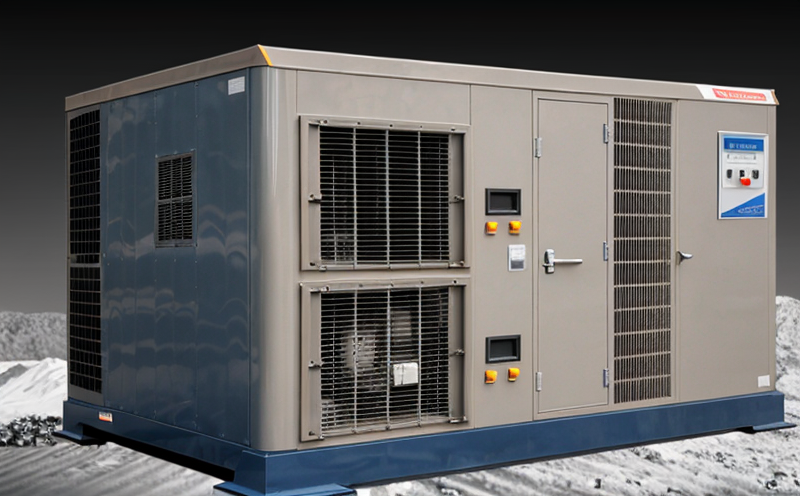ASTM E1875 Dynamic Thermomechanical Analysis Testing
The ASTM E1875 standard provides a method to determine dynamic mechanical properties of materials under conditions simulating thermal and environmental stresses. This test is particularly important for the semiconductor and microchip industries, as it helps ensure that devices can withstand harsh operating environments without failure.
Dynamic Thermomechanical Analysis (DTA) involves subjecting specimens to controlled heating or cooling in a furnace while measuring the temperature and heat flow simultaneously. The ASTM E1875 test focuses on evaluating the thermal stability of materials by examining how they respond under changing temperatures, particularly around their glass transition points.
For semiconductor devices, this is crucial because even minor deviations from expected performance at elevated or reduced temperatures can lead to significant reliability issues. By using ASTM E1875 testing, manufacturers can predict potential failure modes and optimize design parameters to meet stringent quality standards.
The test setup typically involves placing the sample in a furnace that can be precisely controlled for temperature changes. The sample is then subjected to heating or cooling cycles while sensors monitor its thermal response. The resulting data provides insights into the material's behavior under stress, helping engineers make informed decisions about component design and manufacturing processes.
One of the key advantages of ASTM E1875 testing is its ability to identify early signs of degradation in materials before they become evident through functional failure. This allows for proactive measures to be taken during product development cycles, ensuring that final products meet all required specifications.
The accuracy and repeatability of ASTM E1875 tests are ensured by adhering strictly to the guidelines outlined in ISO standards. These include precise control over environmental parameters such as temperature, humidity, and air flow within the furnace chamber. Rigorous calibration procedures for all instrumentation further enhance reliability.
When selecting specimens for testing according to ASTM E1875, it is important to choose representative samples that accurately reflect the intended application of the material being evaluated. Proper preparation includes cleaning, conditioning, and cutting the sample into appropriate dimensions. It’s also crucial that the furnace used supports the necessary temperature ranges required by the specific material under examination.
The results from ASTM E1875 testing are typically presented in terms of thermal expansion coefficients, glass transition temperatures (Tg), melting points, and other relevant physical properties. These data points serve as critical inputs for further analysis aimed at improving product performance and durability.
In summary, ASTM E1875 dynamic thermomechanical analysis testing plays a vital role in ensuring the reliability of semiconductors and microchips by providing detailed information about their thermal behavior. By incorporating this type of testing into manufacturing processes early on, companies can significantly reduce risk associated with product failures due to environmental stresses.
Industry Applications
- Semiconductor manufacturers use ASTM E1875 testing to assess the durability and reliability of silicon wafers during various stages of production.
- Microchip designers rely on this method to evaluate how different materials will perform under extreme temperature conditions before integration into end products.
- Electronic component suppliers utilize ASTM E1875 results when certifying their products comply with industry standards related to thermal performance.
- Data storage device manufacturers employ these tests to ensure that read/write heads function correctly across a wide range of temperatures.
Customer Impact and Satisfaction
By leveraging ASTM E1875 dynamic thermomechanical analysis testing, our customers experience enhanced product quality and reduced risk of failure. This service ensures that the semiconductors and microchips they produce or procure meet strict international standards for performance and reliability.
Our team of experienced professionals works closely with clients to understand their specific needs and goals, tailoring each test accordingly. We provide detailed reports that not only outline the results but also offer actionable recommendations based on those findings.
The high level of accuracy provided by ASTM E1875 testing contributes directly to customer satisfaction by delivering reliable data that can be used confidently when making decisions about product design and manufacturing processes.
Our commitment to excellence in this area has earned us a reputation as a trusted partner for semiconductor and microchip manufacturers worldwide. We pride ourselves on providing comprehensive support throughout the entire testing process, from initial consultation through final report delivery.
Environmental and Sustainability Contributions
The ASTM E1875 dynamic thermomechanical analysis testing not only ensures high-quality products but also plays a role in promoting environmental sustainability. By helping to identify materials that are more resistant to temperature variations, this test contributes to the development of greener technologies.
Through its precise evaluation of thermal properties, ASTM E1875 supports efforts aimed at reducing energy consumption and waste generation during manufacturing processes. For instance, by optimizing design parameters based on accurate test results, companies can reduce the amount of raw materials needed while minimizing production costs.
The data obtained from these tests also aids in the creation of longer-lasting products that require less frequent replacement, thereby extending the lifespan of electronic devices and reducing electronic waste. This aligns perfectly with global initiatives focused on promoting circular economy principles within various industries.





